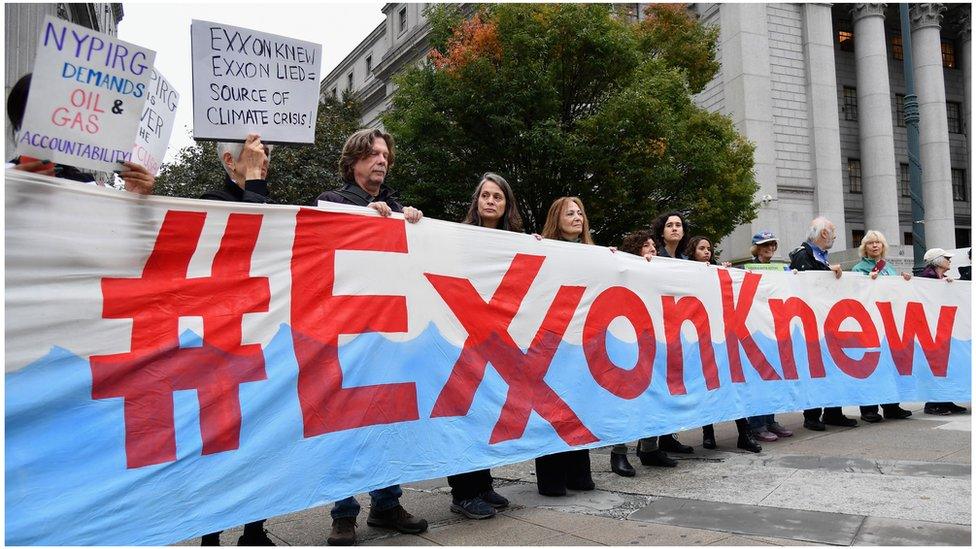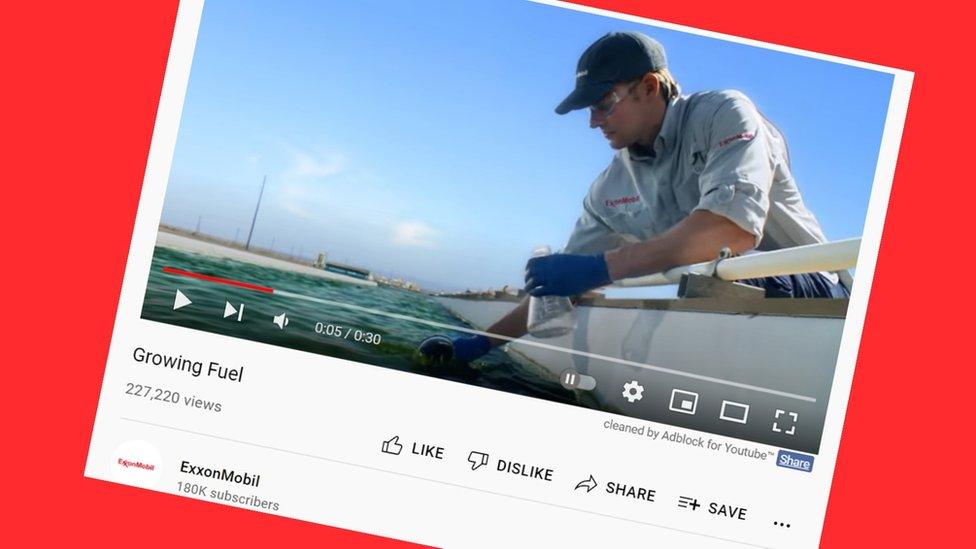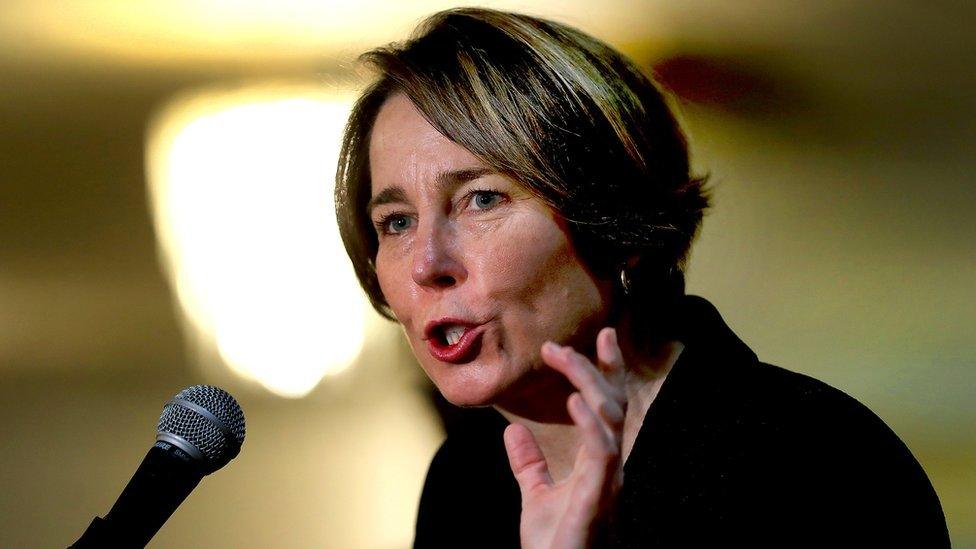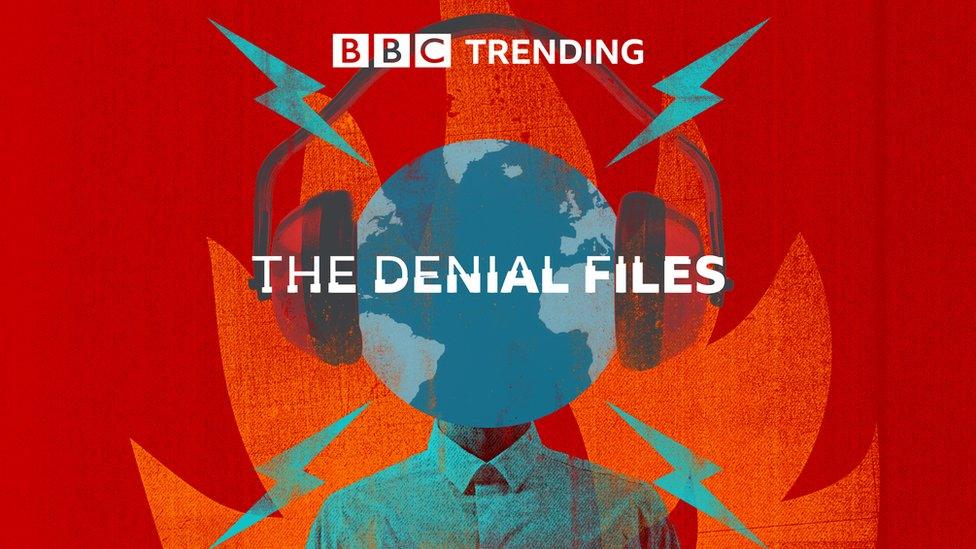Climate change: The US state taking on an oil giant for greenwashing
- Published

The question of responsibility for the effects of global warming is - slowly - being tested in court. One case in Massachusetts is using consumer laws to take on oil giant ExxonMobil. If the US state wins, it will be the first case in the world to successfully prosecute a fossil fuel company for greenwashing and misleading the public.
How much is the fossil fuel industry actually doing to tackle climate change? If you listen to the companies themselves, quite a lot. ExxonMobil, the American oil and gas giant, says it's committed to new energy solutions that don't contribute as much to global warming - such as fuel made from algae.
The firm claims it could "one day power planes, propel ships and fuel trucks and cut their emissions in half". One of its adverts says: "Every technology we're working on helps lower our carbon footprint. Because when it comes to addressing climate change, our actions make a difference."
But not everyone's buying it. "There's this giant disconnect," says Naomi Oreskes, a professor at Harvard University, who's been monitoring disinformation tactics used by big businesses for years.
"The reality of their business model is to continue to exploit, develop and sell oil and gas. But their advertising, their communications, make it seem as if they're these great guys committed to sustainability and renewable energy."

ExxonMobil's investment in algae biofuels is a common theme on their YouTube channel
It's what ExxonMobil's critics have described as greenwashing - pretending to be greener than you actually are. In other words, a form of alleged deception. And - partly because of that - Exxon and other oil companies are fighting various forms of legal action across the US.
The state of Massachusetts is taking on Exxon in court using consumer protection laws alleging the company continues to deceive the state's consumers and investors about the damage caused by its oil and gasoline products. Exxon strongly denies the allegations.
The company has tried - and failed - to get the whole case dismissed on the grounds that many of the allegations made in this case fall outside the jurisdiction of Massachusetts courts, and the ads were not made in or specifically directed at residents in the state.
But it's partly because of what climate change is doing to the people of Massachusetts that the state decided to take Exxon to court. Among other things, the lawsuit, external specifically mentions the threat against fishermen, and their way of life.
'Facing mother nature'
Bruce Silverbrand is a shell fisherman and oyster farmer who's been working on the waters around Bourne, at the gateway to Cape Cod, all his life. His days are marked by tides, winds and whether the crabs are in mating season.
"No traffic, no bosses," he says, "but I answer to Mother Nature for sure - and right now she does whatever she wants."

Trudging into the water day in, day out, means Bruce feels the effects of climate change every day, including the rise in water levels.
"I get out of the boat to do a lot of my work, the water used to only come up to my waist, now it comes up to the middle of my stomach at a good tide," he says. "I'm already looking at buying a bigger crane."
He is worried - the tides have also changed and the weather is becoming more extreme. His oyster farm has now been shut for two months, costing him up to $20,000 (£14,555) after the remnants of Hurricane Ida dumped nine inches of rain around Bourne in early September.
It caused "sewage and runoff to go into the bay and basically foul the water, so you can't take any shellfish out of it", he explains. "I've never seen so much rain ever."
Big Oil in the dock
Some 21 US states are taking fossil fuel giants - including Chevron, ExxonMobil, BP and Shell - to court for alleged greenwashing and, it is claimed, engaging in a decades-long disinformation campaign about the effects of climate change. The companies deny the claims.
It's part of a pattern of legal action against fossil fuel companies, which is also happening elsewhere in the world.
The US cases partly concern historical documents containing information on what oil companies knew and didn't reveal about climate change decades ago. Exxon says some "cherry picked" statements attributed to a small number of employees have been taken out of context.
But in Massachusetts and elsewhere, legal action is also focused on what fossil fuel companies are doing right now.
Why does Massachusetts matter?
"We want the company to stop engaging in misleading and deceptive practices," said the Massachusetts Attorney General Maura Healey, when she first opened the case in 2019.
The Massachusetts case could stretch on for years. Yet it is the one that has progressed furthest. And if successful, it could mean potentially the payment of billions of dollars in compensation.
"Of course, we're seeking civil penalties, but this is really about getting the company to come clean with the public. Stop lying about what they are and what they've been doing."

Massachusetts Attorney General Maura Healey
"You would think that the company's primary business is saving the world," says Karen Sokol, a law professor at Loyola University, New Orleans. "The legal claim is that's a lie. Because your primary business is oil and gas. It is fossil fuels."
Exxon has argued in court documents that no reasonable consumer watching its adverts would think it has stopped investing in fossil fuel products.
And when we asked for comment on specific examples of its advertising, the company said legal cases like the one in Massachusetts waste millions of dollars of taxpayers' money and do nothing to advance meaningful actions that reduce the risks of climate change.
In a statement, it also said the case against it has no merit. It has accused Attorney General Healey of trying to deny Exxon its constitutional right to free speech, and of using legal means to force her ideology on the company.
Exxon says it has invested more than $10bn (£7.25bn) over the past 20 years in researching and developing what it describes as "lower-emission energy solutions". But the company's latest annual report shows, external it invested $10.4bn in 2020 alone in developing new, unexplored oil and gas reserves.
And that gets to the heart of the allegation - the company's adverts promoting green solutions doesn't reflect the vast majority of what Exxon actually does.
Political pressure
Pressure on the fossil fuel industry was on display last month in the US Congress, when - for the first time ever - leaders of the four largest oil companies in the US appeared under oath before a committee of the House of Representatives to discuss claims of climate disinformation.
Exxon's chief executive Darren Woods was among them. He was asked by a sympathetic Republican congressman if he had ever approved a climate disinformation campaign. "No, I have not," he replied.
A more hostile Democrat asked whether any company had the right to lie about climate change and then use the constitutional right to free speech as "a shield against litigation". "I don't believe companies should lie," Mr Woods replied, "and I would tell you we do not do that."
But when asked whether Exxon would match the efforts of European counterparts BP and Shell to reduce oil production, he avoided answering directly, merely repeating: "We're committed to lowering our emissions."
The political and legal battles about climate change look set to intensify, but they aren't making much of a splash with Bruce Silverbrand back on the Massachusetts coast.
"They'll just fight it out forever. I don't think I'll ever see anything out of it," he says. "I've lived my life. I'm 56 years old, and I just wonder what my children are going to be left with? If we don't all get on the same page [about climate change] and do it right now, it's already over."
Listen to The Denial Files: Big oil in the dock on the World Service. Download the podcast or listen online.
